#and the country is home to several reputable universities
Explore tagged Tumblr posts
Text
Discover Bangladesh: A Comprehensive Travel Guide
A Brief History of Bangladesh Bangladesh, located in South Asia, has a rich history that dates back to ancient times. The region was known as Bengal and was a significant cultural and commercial hub. Over the centuries, it saw the rise and fall of several dynasties, including the Maurya, Gupta, and Pala empires. Colonial Period In the late 16th century, the region came under Mughal rule, which…
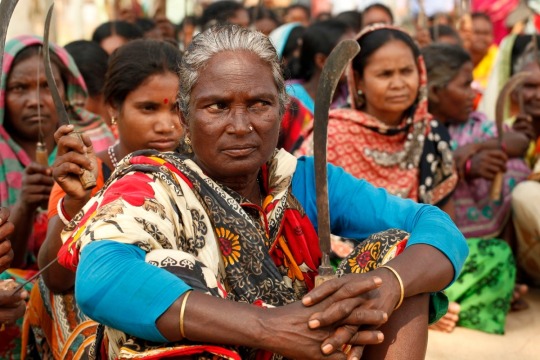
View On WordPress
#A Brief History of Bangladesh Bangladesh#adventure#africa#and a welcoming culture. Whether you&039;re exploring ancient ruins#and accommodation are inexpensive compared to many other countries#and Christianity. The country is known for its religious tolerance and cultural diversity. Food and Culture Bangladeshi cuisine is rich and#and domestic flights. 7. What should I wear in Bangladesh? Dress modestly#and major credit cards are accepted in urban areas#and modern trends#and Pala empires. Colonial Period In the late 16th century#and pitha (traditional cakes). The culture is a blend of ancient traditions#and the country is home to several reputable universities#and the Lawachara National Park. Rangamati: A scenic hill district known for its lakes#and the region became East Pakistan#Bangladesh achieved independence in 1971 following a brutal liberation war. Since then#breathable clothing is advisable due to the tropical climate. 8. Can I use credit cards in Bangladesh? Credit cards are accepted in major ci#Buddhism#but English is widely understood in urban areas and among the educated population. 6. What are the main transportation options within the co#but it&039;s wise to carry cash#but there are extensive bus and train networks for intercity travel. Religion The predominant religion in Bangladesh is Islam#colonial influences#dance#destinations#especially in cities#especially in rural areas and religious sites. Light#especially in rural regions. Conclusion Bangladesh is a vibrant and diverse destination with a rich history#europe#followed by Hinduism#Gupta#has a rich history that dates back to ancient times. The region was known as Bengal and was a significant cultural and commercial hub. Over
2 notes
·
View notes
Text

Walz has served as Minnesota’s governor since 2019 after 12 years in the House of Representatives and now chairs the Democratic Governors Association. He has built a reputation as a folksy politician who can get things done, as Minnesota has adopted a number of progressive laws during his tenure. According to a poll conducted earlier this year, Walz enjoys an approval rating of 55% among Minnesotans. Since Minnesota Democrats achieved a legislative trifecta in the 2022 elections, Walz and his allies have used their power to push a slate of progressive policies. The governor has signed bills protecting abortion access, expanding background checks for prospective gun owners and legalizing recreational marijuana. “Right now, Minnesota is showing the country you don’t win elections to bank political capital,” Walz said last year. “You win elections to burn political capital and improve lives.” That philosophy has endeared him to progressives, who threw their support behind him as the veepstakes kicked into high gear over the past two weeks. They reshared clips of Walz lovingly mocking his daughter’s vegetarianism and tinkering with his car to paint him as the dad that America needs right now.
This is fucking awesome! Honestly, sincerely good news and a very promising pick for the potential Harris Administration. An aggressive, unabashed, popular, populist left-winger with a track record of enacting real, substantive help for people is capital-G Great.
What has he done, specifically?
Abortion rights
In a 1995 ruling, the Minnesota Supreme Court upheld abortion rights in Minnesota. In January 2023, Walz signed the PRO Act (Protect Reproductive Options Act) into law, making abortion a "fundamental right," as well as access to contraception, fertility treatments, sterilization and other reproductive health care.
The law made Minnesota the first state to codify abortion rights in the aftermath of the U.S. Supreme Court's 2022 ruling in the case of Dobbs v. Jackson Women's Health Organization, which nullified Roe. v. Wade after nearly 50 years of precedent. In April 2023, Walz signed the Reproductive Freedom Defense Act into law, shielding women and providers from any legal action originating from the patient's state.
Pro-LGBTQIA+ legislation
In March 2023, Walz signed an executive order to protect the right of residents to have access to gender-affirming health care. Weeks later, he signed the "Trans Refuge" bill, banning the enforcement of arrest warrants, extradition requests and out-of-state subpoenas for those who traveled to Minnesota for care.
"When someone else is given basic rights, others don't lose theirs," Walz said. "We aren't cutting a pie here. We're giving basic rights to every single Minnesotan."
Paid family, medical and sick leave
In May 2023, Walz signed a law creating a state-run program to provide paid family and medical leave for Minnesota workers, funded by a 0.7% payroll tax on employers, by 2026.
Legalization of recreational marijuana
In May 2023, Minnesota became the 23rd state in the nation to legalize recreational cannabis use. Three months later, people 21 and older could start to possess certain amounts of marijuana at home and on their person, in addition to legally growing up to eight plants at a time.
Restoration of voting rights for former felons
In March 2023, Walz signed a bill that restored the right to vote to more than 50,000 convicted felons who had already served their time.
Universal school meals
Amid the increase in food insecurity for many Minnesotans during the pandemic, and the subsequent strain on the state's food shelves that remains to this day, Walz signed a bill in March 2023 that ensures all K-12 students in the state have access to free breakfast and lunch on school days.
Do you know what makes this even better?

Fuck 'Em. I know negative partisanship is important and can help motivate right-wingers to vote, but they're going to vote anyway. And him being afraid of Walz is just a sign that he's a good pick, in policy and politics.
#donald trump#kamala harris#2024 election#Tim Walz#progressive politics#original content#politics#good news#legalization#trans care#voting rights#lgbtqia#worker rights
2K notes
·
View notes
Text
I often post about Palestine but I'd like to take a moment to talk about what's happening in Bangladesh.
KEEP YOUR EYE ON BANGLADESH
TL;DR Students killed for protesting the government's quota system. Students are being arrested and murdered for speaking up about their deceased friends. Everyone is being threatened by the government and many social media platforms are being banned.
All I'm asking is to spread the word. Please. International pressure really works for our nation. We're dying here. UNICEF reports 34 children dead. There might be more. All reblogs and likes and shares are appreciated. Thank you. I guess I'll see you tomorrow.
Past
A movement protesting the government's quota system put forth by the father of our nation Sheikh Mujibur Rahman. This was placed in the first place to help the grandchildren of those who fought in the Liberation War of our country to get government jobs. We have a terrible job market here which is why many highly educated people leave the country. On 16th July, While protesting, a Student named Abu Sayed of Begum Rokeya University was killed by the police. This only stoked the feelings of injustice between the students.
During a press conference, the PM was asked about the quota for the grandchildren of veterans. Her response? "If we don't give jobs to the grandchildren of Veterans, will we give jobs to the grandchildren of Razakars?" Razakars are the people who collaborated with the Pakistani Forces to bring down the Bangladeshi freedom fighters. They betrayed the nation for their own gain.
Traitors.
Imagine calling the youth of your nation traitors.
Imagine calling almost 14 million young people who can't find a job despite their credentials betrayers.
Imagine cursing people who are protesting for job equality under a government with the all time highest corruption in the history of this nation.
On 17th July the broadband connection centre in Mohakhali was burned down. Mobile data services and communication were shut down by the PM. After 11 days the internet was properly restored.
On 19th July, A National Military Curfew was put in place by the Prime Minister to mitigate the unrest.
But that was last month. If you need details I highly recommend sources in Bangladesh like the Daily Star or reputable like Al Jazeera. The quota has since been lifted. Lives were lost. But it was for a good cause, right?
Right?
RIGHT?
Present
Well no. There's still a curfew in the capital. Several districts like Cumilla are still under attack. The government warns of not spreading misinformation yet still lie about the severity of the issue. The police are arresting those who protest as well as those who speak up. The students are demanding for the resignation of the PM. The PM obviously refuses to apologise or even acknowledge the deaths of some 147?
or is it 200?
They're not counting how many they're killing. They're not letting anyone else count either.
It is midnight here. This morning as in 4th August 2024, the students have called for a non cooperation movement. The Ruling Party Awami League will also be holding rallies across the nation tomorrow. I do not know what is going to happen to me. I do not want to think of what will happen to my family tomorrow. I don't really care. What I'm truly scared for is the future. As these protests do not end well here.
Future
Precedence says the PM will eventually resign. Every student protest of our nation has ended in momentary success.
Momentary
What comes after is usually a military regime. A caretaker government until a next government is chosen in a supposed election. Even then if they decide to hold an election. The caretaker government is usually run as a dictatorship. It was true for the 60s. It was true for the 90s. I don't doubt it will happen again.
I'm graduating next year. My niece is still new to the academic system. I wish her the best. My grandmas and grandpas are dead. Nobody left to pray for me. My aunts and uncles are growing old. My cousins can't speak up for fear. My mom is so tired. My dad is angry. I'm unsure if I will still be able to post the next couple of days.
All I'm asking is to spread the word. Please. International pressure really works for our nation. We're dying here. UNICEF reports 34 children dead. There might be more. All reblogs and likes and shares are appreciated. Thank you. I guess I'll see you tomorrow.
#bangla tag#bangladesh#save bangladeshi students#save Bangladesh#bengali#house of the dragon#supernatural#hetalia#fnaf#motogp#deadpool#deadpool and wolverine#lana del rey#olympics#welcome to the table#ben brainard#wttt#welcome to the statehouse#wttsh#john oliver#community#ian duncan#tommy says#current events#politics
167 notes
·
View notes
Text
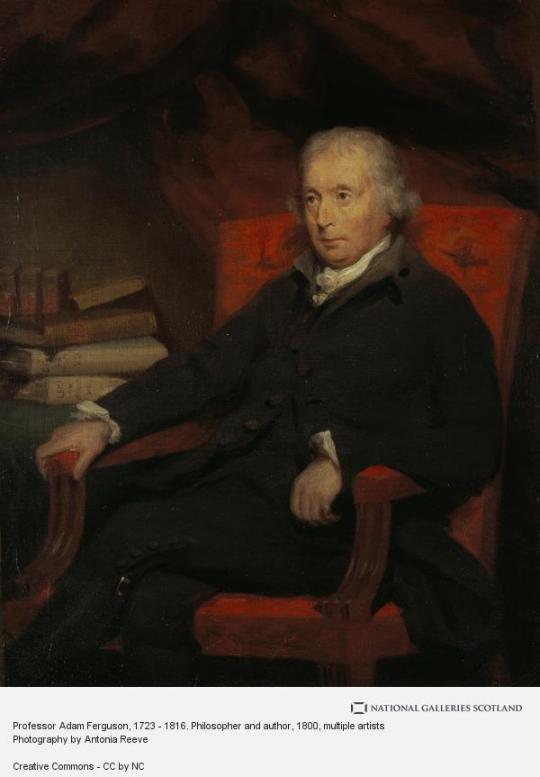

On June 20th in 1723, Dr. Adam Ferguson, Scottish historian and philosopher, was born.
Adam Ferguson was a student at St Andrews, later Professor of Natural Philosophy and in time, Moral Philosophy and Pneumatics at the University of Edinburgh.
In 1767, Ferguson published his masterpiece, the Essay on Civil Society. It was a natural history of the progress of mankind, of the kind that had been pursued by many Enlightenment philosophers. David Hume once claimed that Ferguson had “more genius than the rest”, but he disliked Ferguson’s essay, regarding it as superficial. This was the period called the Scottish Enlightenment and it was in Ferguson’s house Sciennes Hill House in Edinburgh, (a famous meeting place of the local literati) that Robert Burns and Walter Scott are thought to have met for the first and only time, when Scott was an adolescent. Can you imagine how the young Walter Scott must have felt being in the company of all these giants of The Enlightenment?
The story goes goes, as Scott recalled it later in 1827: “I was a lad of fifteen in 1786-7, when he came first to Edinburgh, but had sense and feeling enough to be much interested in his poetry, and would have given the world to know him; but I had very little acquaintance with any literary people, and still less with the gentry of the west country, the two sets that he most frequented.“Mr Thomas Grierson was at that time a clerk of my father’s. He knew Burns, and promised to ask him to his lodgings to dinner, but had no opportunity to keep his word, otherwise I might have seen more of this distinguished man.“As it was, I saw him one day at the late venerable Professor Fergusson’s, where there were several gentlemen of literary reputation, among whom I remember the celebrated Mr Dugald Stewart. Of course we youngsters sate silent, looked and listened.“The only thing I remember which was remarkable in Burns’ manner, was the effect produced upon him by a print of Bunbury’s, representing a soldier lying dead in the snow, his dog sitting in misery on the one side, on the other his widow with a child in her arms. These lines were written beneath, – ‘Cold on Canadian hills, or Mindens’ plain, Perhaps that parent wept her soldiers slain: Bent o’er her babe, her eye dissolved in dew, The big drops, mingling with the milk he drew, Gave the sad presage of his future years, The child of misery baptized in tears.’ “Burns seemed much affected by the print, or rather the ideas which it suggested to his mind. He actually shed tears.“He asked whose the lines were, and it chanced that nobody but myself remembered that they occur in a half-forgotten poem of Langhorne’s, called by the uncompromising title of The Justice Of The Piece.“I whispered my information to a friend present, who mentioned it to Burns, who rewarded me with a look and a word, which, though of mere civility, I then received and still recollect, with very great pleasure.”
Ferguson retired to St Andrews (his house, with sundial over the door, can still be seen on South Street) and died in St Andrews in 1816. He is buried in the grounds of St. Andrews Cathedral.
The top picture shows Ferguson in 1702 and is by Joshua Reynolds the second is an interpretation of the meeting of Burns and Scott, by Charles Martin Hardie, also present are Adam Smith and Dugald Stewart; the physician, Joseph Black; the geologist, James Hutton; and the dramatist John Home, author of the immensely popular play, Douglas. A group of unnamed ladies congregates in a far corner, eyeing the poet curiously.
9 notes
·
View notes
Text

On the 23rd day of @hprecfest this fandom gave to me...
Day 23: a crossover or AU fic
Title: Threshold by @kbrick
Pairing: Draco x Harry
Explicit | 126.4k words
Summary: Unspeakable Draco Malfoy finally gets his chance to consult with the Auror Department when a series of mysterious doors covered in runic symbols appear all across the country, only to fade away minutes later. Draco’s eager to help solve the mystery of the doors until he’s partnered with Harry Potter, who still treats him like an enemy.
Things go from bad to worse when the reluctant duo find themselves on the wrong side of a door, trapped in a world where one wrong move might prove fatal. Between the menacing forest creatures and the bloodthirsty ruling class, no place seems safe.
To get home in one piece, Draco and Harry must put aside their differences and learn to rely on one another. Easier said than done.
Why I recommend it:
This fic literally takes place in an alternate universe (mostly).
Auror Harry Potter and Unspeakable Draco Malfoy find themselves trapped in another world where magic doesn't work the way that they had always been taught it did, the flora and fauna can be hostile and they have no Earthly clue how to return to their own. These two begin working on the case of the doors with nothing but irritation and hostility towards each other. It seems to be a benefit to their relationship that Draco is much more preoccupied by his fascination for the ancient magic of this other world than he is with antagonizing Harry. Eventually - specifically after they find themselves trapped in this other world - Harry begins to relax around Draco and they slowly learn to trust each other as the need to lean on the other becomes apparent.
As a massive fan of the Witcher, kbrick built a fantasy world that felt similar in so many wonderful ways but distinctly different and unique. I was physically incapable of putting this fic down until I finished it, the world building is, to date, some of the best I've ever read. The original characters we are introduced to are all so unique and interesting. I grew to become so attached to several of them, and to loathe some of them with every fibre of my being. If you can write a character that I can come to feel either of those extremes for, then you've got yourself an absolutely wonderful character.
Draco and Harry begin to develop a fragile, undefined relationship in this other universe that becomes a terrifyingly huge question mark of a thing as the time to return home draws nearer. When Draco is faced with the choice between returning to his own world - where he continues to struggle with the reputation that the Malfoys were left with after the war - and staying in this strange new world full of opportunity and unknown knowledge where he can essentially start again without the shadow of his past over him at all times, he has a difficult time making a decision.
This fic is so cool because as much as it's a love story, it's also chock full of mystery, adventure, action, tension, wonder and intrigue. The strife that is going on in this other world between the reigning monarchy and the rebels that Harry and Draco take up with is gripping. Harry and Draco both learn to use broad swords and ride horses and it is incredibly hot. The gradual way in which they become anchors for each other in this unfamiliar world feels so logical and rings with a profound rightness that had me in desperate need of a happy ending for them.
This fic sould be a 5 book epic like the Witcher series. I would buy the boxed set and read them until the pages began to fall out. If kbrick ever chooses to revisit this universe, you can bet your ass I will be sat for every single word.
12 notes
·
View notes
Text

November 2022: The Lies in the Legend
Wordcount | 56,143 Genre | Fantasy/Political Intrigue/Fictional Biography POV | 1st Person POV Setting | Fictional world of Irim Status | Incomplete Draft, WIP
Synopsis
'Lady Ghislaine Agassi of Selniril' is a household name across many parts of Irim, and nowhere moreso than in her home nation, the Principality of Sha. As an elven noblewoman, her birth as a illegitimate commoner and rise to serving as a diplomat to several foreign countries over the past five centuries of her life has captured the attention of many and earned her a famous - or infamous - reputation for her direct involvement in several shifts in Irim's political landscape. Stories abound about her professional - and personal - exploits. Lady Ghislaine has now taken up a pen to offer an account of her own. In doing so, she looks to clear up some of the more outlandish tales, as well as address the near-legendary figure some have made her out to be. It's her hope that, in reading this book, those who get to the end will have a better grasp on the dangers of idolizing or villifying those in the public eye.
First Line
Their first meeting was happenstance, unceremonious, and would one day lead to a civil war halfway across the world.
Characters
Ghislaine Agassi - our narrator, has literally always dealt with being the subject of gossip and a little over it, charismatic, opportunistic, manipulative but lowkey about it, perceptive, all she wanted as a kid was to be a trader and now she's out here writing books about the time she was nearly assassinated Emmyth Agassi - Ghislaine's father, kinda ruined his reputation in their community when he went and cheated on his wife and brought home his new daughter, apparently mellowed out after that whole situation though because he was otherwise a very chill dad Madame Celote - a local healer who runs the apothecary in the next town over, takes Ghislaine on as an apprentice, wise and exactly as powerful as she claims to be Nyx Ehlark - a recruiter for the Baird Academy for the Arcane Arts (an arcane university out of the nation's capital), the first to actually manage to spark Ghislaine's ambitions And literally so many more people, this elven bitch is 577 years old, I'm not going through all of them
Pre-Reading Thoughts
I've been wanting to reread this draft for months, and I've intentionally been putting it off because I wanted to be relatively fresh for this read-through. Continuing to work through the first draft of this book is one of my goals for 2025. I think this honestly may have been the most fun I've ever had during November - because while I always get a lot of joy out of the challenge every year, it's usually also carrying its fair share of stress and frustration. Not so with The Lies in the Legend! These 56,143 words were pure fun. I could write another 56K and not break a sweat. And another. And several more, because if I ever actually got to the end of my outline, I'm pretty sure this thing's wordcount would rival The Brick's. A lot can happen in 577 years, okay? Anyways, I can't wait to dive into the rambling, the shameless infodumping, the glossing over large swathes of time, the love letter to my great love of worldbuilding, and the chance to plot out Ghislaine's next arc.

5 notes
·
View notes
Text
"Life is a balance between holding on and letting go."

Timeline
Age 0:
He is born the second child to his mother and father in the city of Tokyo.
Age 2:
He becomes an older brother when his younger brother is born.
Age 3:
His parents have their final child, his younger sister, completing the family.
Age 8:
He demonstrates a level of intelligence that greatly surpasses that of his classmates, astonishing even his instructors with his ability to analyze effectively.
Because of this, he skips several grades ahead of his peers.
Age 10:
His father's job as a diplomatic envoy sees him gone from the house for long periods of time.
He asks his father if he can go with him, but his father refuses, saying he needs to focus on his studies.
Though he is upset, this gives him the encouragement to hurry and complete his schooling.
Age 12:
He manages to graduate high school early, surprising his family.
He attends university but is unsure of what exactly he wishes to study.
He decides to simply take any sort of classes that interest him.
Age 14:
He begins to get bored with his classes and constant studying.
He again asks his father if he can come with him on his travels. His father finally relents, on the promise that he does nothing to disturb his work.
After a four-hour flight, the duo arrives in China, and Kurai is immediately taken in by the sights and sounds of everything.
He spends much of his time in the city of Beijing while his father attends his work.
After two weeks, the two of them return home to Tokyo.
Age 15:
He continues traveling with his father to and fro to various countries in Asia, enjoying the sights and sounds of everything.
He decides he wants to become a cultural anthropologist when he gets older.
He starts taking various classes language, culture and society, and anthropology.
Age 17:
He eventually graduates university with a master's in science.
Thanks to his mother's connections, he manages to obtain a job as a tutor, teaching political science.
He notes that his father, while seemingly still the same, looks a bit apprehensive, as if he is constantly watching over his shoulder for something... or someone.
Both he and his wife notice and ask him if something is wrong, but his dad plays if off, which worries both of them.
Age 18:
One night, whilst coming home from work, he senses something wrong as he approaches his home.
He finds all of his family, save his father, who fighting against a masked adversary, who flees upon Kurai's arrival.
Before his father can reveal what happened or who the killer was, he succumbs to his wounds and dies.
He buries his family in a mass grave and spends some time mourning their deaths.
Afterwards, he starts searching for any sort of clue that can explain why his family was killed, starting with his father's work.
He spends his time digging through his father's documents, but nothing alarming pops out at him.
He realizes he must seek outside help and decides right then and there to become an assassin.
Age 20:
He spends almost two years training, before taking his first official contract.
Age 21:
He slowly builds up a reputation as an effective and emotionless killer, but deep down, he struggles with the harsh realities of assassination.
To combat this, he begins studying philosophical texts left behind by his father and scholars.
This lays the foundation for his eventual belief in both harmony and balance.
Age 22:
He forms temporary alliances with other assassins, using their resources to track down his family's killer.
Despite the texts he studies, he still secretly questions the moral cost of his own actions.
Age 23:
He finally manages to track down his family's assassin, ironically, residing in Beijing.
Before the fight, Kurai asks the killer why he targeted his family, but the killer refuses to answer.
A long ensuing fight begins, which attracts a lot of attention.
In the end, Kurai emerges victorious, though he is wounded.
Before he dies, Kurai asks the assassin once more what was the point behind his family's killing.
The assassin reveals that his family's death wasn't personal; in fact, his only target was Kurai's father, who had a hit on him by someone who wanted him out of the way, because he threatened the interests of someone who didn't like his peacekeeping efforts.
When asked who it was who hired him, the assassin dies from his wounds before he can answer.
Soon after, he is arrested by the Chinese government.
Whilst awaiting his sentence, he thinks back to his duel.
Though he was victorious, the encounter left him emotionally hollow.
Just before his trial, it is announced that he is being sent back to Japan, since he is technically a Japanese citizen.
Upon returning, he is told that he has two options: join the Japanese army, or be put to death. He chooses the former.
Age 24:
During his time in the army, he is immediately noticed for his incredible intellect, which quickly sees him rise through the ranks.
His analytical mindset allows him to write military treatises, which becomes required reading for all soldiers.
Soon after, WWIII breaks out. He doesn't actively engage in battle, but acts as a tactician and strategist, which helps the Japanese army.
Age 26:
The war soon ends, which concludes Kurai's service.
The war leaves a deep effect on him, and he struggles to find something to fill the void in his life.
He decides to travel around Japan, in hopes of finding some semblance of peace.
Age 27:
He arrives in the city of Wakayama, where he is introduced to the concept of 'Onmyōdō', or 'The Way of Yin & Yang'.
At first, he doesn't understand it but slowly begins to open himself up to the philosophy, trying to maintain balance in all things.
He studies earnestly, and soon becomes a well-known onmyōji, likened to the famous Abe no Seimei.
He also becomes a 'Sōsai', someone who performs rituals or ceremonies for spiritual purposes, mainly warding off dangerous spirits, and sending them to rest.
For the first time in a long time, his life feels at peace.
Age 28:
One night, whilst performing a ritual at a shrine, he meets a strange woman with a burnt scar on her face.
Their meeting is hostile, but they pay each other little to no attention besides a few words.
A month later, the two meet again a tea hut during a storm. Though they still do not trust each other, they manage to have a respectable discussion with each other, getting each other's viewpoints.
They meet once more at the shrine where they first met, working together to dispel a rogue spirit, which leaves them with a newfound respect for each other. He finally learns her name, which is Kikyo Yomogi.
They continue to meet up at various points, with the both of them looking forward to seeing each other.
He later asks her for her hand in marriage, which she accepts.
Age 29:
During a nightly ritual, he comes into contact with a strange female spirit who cannot remember anything about herself.
He prepares to dispel her, but is stopped by Kikyo, who, for some reason, feels something for this strange spirit.
They adopt the young spirit, whom Kikyo names 'Rin'.
They create a spirit necklace for her, which will help keep Rin's spirit tethered to Earth until they figure out what has happened to her.
Age 30:
Present.
Kurai receives an "invite" from Chuohku to participate in the D.R.B. With little choice in the matter, he accepts.
He forms the Wakayama Division rap battle team, Luna Coven, alongside Kikyo Yomogi and Rin Kuroki.
Schedule
12 a.m. - 5 a.m.: Asleep
5 a.m. - 6 a.m.: Morning meditation
6 a.m. - 7:30 a.m.: Freshens up
7:30 a.m. - 8:30 a.m.: Has breakfast with family
8:30 a.m. - 12 p.m.: Performs cleansing rituals/Crafts protective charms in workspace
12 p.m. - 1 p.m.: Lunch
1 p.m. - 2:30 p.m.: Martial arts training
2:30 p.m. - 4:30 p.m.: Afternoon reading
4:30 p.m. - 7 p.m.: Evening ceremonies at temples, forests, or other holy sites
7 p.m. - 8 p.m.: Dinner with family
8 p.m. - 9 p.m.: Tutors Rin in philosophy/Strategizing for Division Rap Battle
9 p.m. - 10 p.m.: Evening meditation
10 p.m. - 11 p.m.: Free time, typically more reading
11 p.m. - 12 a.m.: Asleep
Character Hashtags
Regular Hashtags
#Balance in all things
#Written in the stars
#Peace and harmony
Trauma Hashtags
#Family is gone too soon
#Revenge didn't bring peace
#The world is out of balance
Other Info
Hobby: Crafting charms
Weakness: Overanalyzes things
Trauma: "I sought justice through vengeance, but instead, I chained myself to a cycle I may never escape."
Twitter: @Balanceintheuniverse
Drinks: Occasionally
Smokes: No
Special Skill: "I can recall entire texts with perfect clarity."
Intro Quote: "Existence is not purely disorder or strict regulation; rather, it is the equilibrium that connects the two."
Trauma Quote: "It's finished, but... why do I still feel this emptiness? I avenged them, but... nothing's changed. ...Why has nothing changed? Why do I still feel like this?!"
#hypmic oc#hypnosis mic oc#hypmic#hypnosis mic#hypnosis microphone#kurai amamiya#luna coven#wakayama division#trauma#get more info#paradox live#twitter#timeline
5 notes
·
View notes
Text
On Sunday, Iranian President Ebrahim Raisi and several other officials, including Foreign Minister Hossein Amirabdollahian, died in a helicopter crash. This incident occurred following an unprecedented round of escalation between Iran and Israel in April, sparking speculation on the potential implications for Iran’s regional policy and the ongoing conflict with Israel.
Despite the sudden vacuum that has emerged at the top of Iran’s executive branch, the strategic direction of its foreign and regional policies, primarily determined by Supreme Leader Ayatollah Ali Khamenei and influenced by the Islamic Revolutionary Guard Corps (IRGC), are expected to remain unaltered. However, the recent escalation between Iran and Israel is already impacting Iran’s strategic thinking and its regional calculations.
For Iran, Israel’s April 1 attack on the Iranian embassy compound in Damascus that killed several IRGC members, including high-level commanders, crossed a line. From its vantage point, both the targets’ seniority and the facility’s character represented an unacceptable Israeli escalation.
As an immediate matter, Tehran believed that leaving unanswered an attack on what it considers equivalent to sovereign territory could lead Israel to target more Iranian officials on Iranian territory. But perhaps more importantly, Iranian officials likely perceived the Damascus attack as the latest way station toward a bigger objective: an Israeli incursion into Lebanon aimed at cutting off Hezbollah’s logistical support.
Israel’s killing of Brig. Gen. Razi Mousavi outside Damascus in December eliminated the Iranian chief of logistics in charge of supporting Iran’s nonstate allies in the Levant; a similar attack in January removed the IRGC’s intelligence chief in Syria; and taking out Gen. Mohammed Reza Zahedi on April 1 eliminated the chief of operations in that area.
Iran also needed to save face at home and among its regional allies. After the April strike in Damascus, some hard-liners started openly criticizing the leadership. Tehran thus felt it had to react with force, but needed to restore a degree of deterrence without triggering a war.
It squared the circle by conducting a highly telegraphed but massive drone and missile strike on Israel in the early hours of April 14. The priority was not death and destruction—though the scale of the attack risked both—but demonstrating that it dared to strike Israeli territory directly. Tehran likely chose which parts of its capabilities to expose while at the same time gathering significant intelligence on Israeli and U.S. defensive capabilities.
The commander of the IRGC’s aerospace force suggested that Iran deployed less than 20 percent of the capacities that it had prepared for the operation, whereas Israel, helped by the United States and other allies, had to mobilize its full defensive arsenal. If these claims are even remotely accurate, it raises questions over whether the successful defense could be replicated were Iran to mount an even more significant barrage using more advanced weapons, especially one that comes as a surprise and continues over an extended period of time.
While Israel and its partners largely succeeded in neutralizing the attack, Tehran boosted its standing among its supporters, and perhaps its reputation as an avowed defender of Palestinian rights on the Arab street as well. It achieved all this without distracting international attention from the horrors of the war in Gaza—a fact further highlighted by the pro-Palestinian protests on university campuses in the United States and some European countries.
From this perspective, the attack’s success came not from its limited military achievement but from the very fact that it directly targeted a powerful adversary backed by an even more powerful superpower. As Khamenei has contended, the key signal that Iran sent to Israel was Tehran’s high tolerance for risk, which aims to deter Israel from future operations aimed at decapitating the Iranian military and cutting off its hand in the Levant.
Yet the red line set by the IRGC’s chief commander immediately following the strike—that any attack anywhere on any Iranian target would be cause for another direct Iranian attack on Israel—was quickly shown to be an empty threat in light of Israel’s subsequent strike in Isfahan on April 19 local time, carried out with an air-to-surface missile strike from Iraqi airspace on an S-300 missile defense system’s radar, near sensitive nuclear facilities in Natanz.
A return to a status quo ante shadow war is probably an acceptable outcome for Iran. From Tehran’s perspective, it would at best find a way to limit the scope of Israel’s mabam (“war within the wars”) campaign of targeting Iranian arms shipments and facilities in Syria. At a minimum, Iran hopes to put an end to Israel’s targeting of senior Iranian commanders and its humiliating covert operations on Iranian soil. It is too early to determine if Iran can achieve any of these objectives.
A key question now is how the bilateral rivalry fits into the wider regional picture. While Israel and the United States could boast that they activated an ad hoc regional cooperation with Arab states to intercept the salvo of projectiles, the Arab states involved were keen not to be named or seen as taking sides. Contrary to the Israeli attempt to frame Arab states’ actions as signaling the emergence of an anti-Iran regional alliance that would benefit it, Arab leaders instead saw proof of what they have long feared might happen: that tensions between Israel and Iran could put them in the crossfire.
Iranian leaders seem convinced that their retaliation, which did not even include the tip of their regional spear, Hezbollah, successfully mitigated the possibility of further escalation—for now. That defending Israel against an Iranian strike cost upward of $1 billion and required a major team effort involving at least five countries versus a $200 million price tag for Iran implies that neither Israel nor the U.S. seeks additional rounds of fighting. Iran thus has a window to focus on the lessons learned, just as Israel and the U.S. military are likely doing the same.
Despite the Iranian assertion of having pulled its punches, U.S. officials assess that the goal “clearly was to cause significant damage and deaths”—in which case those punches failed to land. This appears to be the result of both offensive vulnerabilities and defensive strengths, as Iranian drones traveling long distances were detected in near-real time, many of the projectiles were intercepted before even reaching Israeli territory, and a significant percentage—perhaps as many as half—of the ballistic missiles reportedly failed of their own accord.
To correct for these failings, Iran may seek to bolster the development and stockpiling of arms closer to Israel, necessitating a deepened presence in Syria, as well as to redouble the development of more advanced missiles—including hypersonic missiles—as part of any future strike package.
Israel’s retaliation was a reminder to Iranian leaders that Israel has the capability to do significant harm to Iran’s nuclear facilities. It also exposed Tehran’s principal shortcomings—its lack of more capable air defense systems like the S-400, as well as Israel’s essentially unchallenged ability to penetrate neighboring airspaces. To address the former, Tehran is likely to redouble efforts to obtain advanced Russian weaponry in exchange for ballistic missiles, even if doing so would further damage Iran’s relations with Europe.
Addressing the latter shortcoming could also cause it to look for help from Russia, especially in Syria; but in Iraq, the U.S. military stands in the way, which is likely to further motivate Iran to try to evict the nearly 2,500 U.S. forces from Iraq by encouraging its allied militias to continue targeting U.S. bases and ramping up political pressure on the Iraqi government.
Tehran is also likely to intensify efforts aimed at loosening the already precarious hold of the U.S.-allied, Kurdish-led Syrian Democratic Forces on territory east of the Euphrates River in Syria. This could give Iran more land access points to Syria (and to Lebanon beyond), while strengthening its influence on the river’s western bank in Deir ez-Zor province. Finally, Tehran will also likely focus on addressing repeated intelligence failures that have exposed its senior commanders abroad and rendered it vulnerable at home.
Iran’s leadership believes that the capabilities it has demonstrated since October—the asymmetric warfare capacity of its regional partners as well as the enduring image of Iranian warheads soaring over Israeli skies—could, together with the Gaza conflict’s fallout, portend a regional reordering.
In Tehran’s eyes, Israel will become increasingly ostracized globally; the United States will no longer be the region’s most pivotal player as other powers like Russia, China, and India extend their influence; and the Gulf Arab states will steer clear of banding together against Iran, instead seeking to improve their relations with Iranian allies such as Syria and Hezbollah.
The Iranian leadership complement this vision with a desire to consolidate Iran’s status as a threshold nuclear weapons state that could in short order develop a nuclear warhead, which would complicate any future deal aimed at significantly rolling back Iran’s nuclear capabilities, especially given Tehran’s cynicism about the West’s ability to deliver effective and sustainable sanctions relief.
Yet Iranian leaders may find that enduring realities will undermine their bullish narrative and bring both short- and medium-term risks. Given that Iran and Israel have yet to fully define and test any new rules of the game, both may miscalculate, especially because those in Tehran who believe that Iran should abandon its vaunted strategic patience and replace it with a more aggressive posture appear to be ascendant. These hard-liners believe that Israel will soon test Iran’s willingness to stand firm on its red lines, and that if Tehran fails to do so, the returns from the massive risk it took on April 14 will be lost.
That increases the risk of miscalculation on both sides and could lead to an escalatory cycle that could be devastating. In the medium term, what Iran sees as the beginning of an emerging new order to replace a vanishing Pax Americana in the Middle East could instead push Gulf Arab states to double down on their request for stronger U.S. security assurances, and this in turn is bound to deepen Tehran’s perception of the threats it faces.
10 notes
·
View notes
Text
Gangland shootings and bombings that have plagued Sweden's biggest cities have spread to quieter suburbs and towns, shattering its reputation as a safe and peaceful nation.
Half an hour north of central Stockholm, Upplands-Bro features lakeside boat clubs, copper-red wooden villas and apartments flanked by pine and spruce trees.
But a 14-year-old boy was found dead in a forest here in August, and since January there have been several shootings and bombings targeting houses and apartments.
"It's awful. We've [been] woken up by explosions in the neighbourhood and it's scary," says 42-year-old Anna Petterson, who lives in Bro and has three children. "It's very much something that we're aware of, and we talk about a lot, and are afraid of."
Sweden has been a European hotspot for gang-related shootings and bombings for several years. But recently the violence has shifted beyond low-income, vulnerable urban areas and police say one reason is that gang members are increasingly targeting rivals' relatives.
Detectives suspect some of the latest violence has been organised by criminal leaders based in other countries, including Turkey and Serbia.
More than 50 people have been killed in shootings so far in 2023, and there have been more than 140 explosions. Last year, more than 60 people died in gun violence, the highest number on record.
"What started out as gun violence between young gangs looking to defend their territory has turned into a vicious circle of firearms trafficking and gun violence," explains Nils Duquet, a firearms researcher based at the Flemish Peace Institute in Brussels.
"Gangs have also matured and are no longer just the street criminals, but are often connected to higher-level criminals as well."
Innocent bystanders are also among the dead.
In September, a 70-year-old man and another man aged 20 were killed in a pub shooting in Sandviken in central Sweden, and a newly graduated teacher, 24, died in an explosion just outside the university city of Uppsala.
Soon afterwards Sweden's Prime Minister Ulf Kristersson gave a rare national address admitting that "no other country in Europe" was experiencing this sort of situation, and promising tougher penalties for deadly violence.
Evin Cetin, an author and lawyer who has represented teenage shooting victims and suspects, says boys as young as 13 or 14 are being recruited by gangs, often through social media promises of money and designer clothes.
"Children are using their own bags not to carry books, but they carry the drug markets in Sweden on their own shoulders," she tells the BBC on a visit to Upplands-Bro, part of a nationwide schools tour to more than a dozen areas affected by gang crime.
Others are trying to tackle the problem by organising street patrols in areas affected by drugs and violence.
"That we're out and go around chatting with our kids and young people - it increases safety," says Libaane Warsame, during a night walk in Jarva, northern Stockholm, on a wet, windy Friday night.
Jarva looks like a lot of Swedish suburbs, with well-maintained apartment blocks, a few shops, and a nearby forest. The main difference is that it is more multicultural than many neighbourhoods, and it has Stockholm's highest unemployment rate.
Mr Warsame began patrolling the streets after his 19-year-old son - who police say was not in a gang - was killed in a shooting in December 2020.
"It's hard for [young people] to sit at home for hours without any income, any work. So they go out and stand around and there's a big risk that they will be recruited."
He also runs an organisation that supports families who have lost loved ones in deadly violence.
This year there have not been any fatal shootings in Jarva, but many locals say they remain on edge.
"I haven't been outside so late… because I don't want to make my mum worried," says Gizem Kuzucu, 17.
She often spends her evenings studying at Framtidens Hus, a youth centre, and says none of her friends have been in trouble with the law. But she has been exposed to crime on social media.
"I've seen a lot of videos on TikTok [in which] people are, like, talking about crime. They are like saying 'follow me on Instagram, I'm gonna post like a rapper that got killed'."
Another teenager at the youth centre, Libaan, says he grew up around older criminals and "did commit a few crimes" when he was younger.
"Kids here, they are really, really mean to each other…they don't know how to speak about their emotions, so what they do instead is that they lash out," says the 18-year-old.
Swedish police do not currently map gang members' nationalities, but research for the Swedish National Council for Crime Prevention in 2021 showed young people born in Sweden to two parents from abroad were overrepresented as suspects in murder cases and robberies.
The right-wing coalition government, elected in September 2022, believes the rise in gang violence in recent years is directly connected to Sweden's earlier immigration policies. Until 2016, it had one of the most generous asylum laws in Europe.
"We can now see that 'outsideship' and lack of integration, in combination with trade of narcotics and organised crime is creating this very, very toxic mixture," Foreign Minister Tobias Billstrom told the BBC in September.
The government wants to make it harder for immigrants from outside the European Union to get social benefits, and to make preschool compulsory for children with two foreign parents in some areas, in order to improve Swedish-language skills.
Earlier this year, it became an offence to recruit children to participate in criminal activities. Stop-and-search zones are set to be introduced in early 2024 and ministers want to double prison sentences for offences including gun crimes and explosions.
The BBC was not granted a government interview to discuss these plans, despite multiple requests.
At the state-funded Swedish National Council for Crime Prevention, researcher Klara Hradilova-Selin believes tackling gang crime "should have been a more important issue earlier" for previous coalitions on both the right and left of the political spectrum.
"There are colleagues of mine who were actually warning like decades ago [about] this kind of development of growing marginalisation in the deprived areas."
Worries about how gang conflicts are impacting the country's international image are also growing. "Sweden has always been viewed as an extremely safe country. Maybe one of the top safe countries in the world. And this image is falling apart," says Hradilova-Selin.
According to a recent survey for the Stockholm Chamber of Commerce, eight out of 10 Swedish companies questioned believe it will get harder to attract foreign talent, investment and visitors due to the ongoing violence.
At Framtidens Hus youth centre, teenagers are being offered the chance to drive, dance and make podcasts. Former criminal Libaan says he would like a job that involves writing, or helping others, but he believes his future is also dependent on how he is treated by other Swedes.
"I don't feel included in the culture even though I'm born here. They kind of see me as this ghetto kid who has no future."
11 notes
·
View notes
Text
The New Formalist: Edward Durell Stone
This is the second part of a two-part post. Read part one.
Stone’s Academic Career
During the late 1940s into the early 1950s Stone was an “associate professor of architecture at the Yale University School of Architecture” (2). His reputation allowed him to connect with other prominent architects in academia such as Walter Gropius at Harvard University’s Graduate School of Design, and Pietro Belluschi, dean of MIT’s School of Architecture and Planning. He also guest lectured on architecture at Cornell, Princeton, and Stanford. (2)
A New Woman Brings a New Influence to Edward Durell Stone’s Life
Edward Durell Stone and his first wife, Sarah, divorced in 1952. After his divorce, while on a transatlantic flight, Stone found himself seated next to “Maria Elena Torchio, a fashion writer… and proposed to her before the plane landed” (1). The couple were married in 1954 and “would have two children, Benjamin Hicks Stone III and Maria Francesca Stone” (2).
Stone’s Pivotal Commission in India
In 1954 Stone’s firm was commissioned by the United States government to design a new embassy in New Delhi, India. Stone strived to create a “modern structure that would respect the architectural traditions of its host country” (2). The embassy would define a major shift in Stone’s style which would become known as “New Formalism.” The most prominent feature of the clean, elegant building is its decorative concrete grille. Stone’s hero Frank Lloyd Wright who rarely praised the work of other architects, publicly lauded it (2,4).
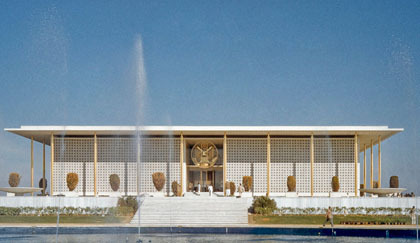
Edward Durell Stone, United States Embassy (1954), New Delhi, India. Image source.
Architecture critic Paul Goldberger called it “one of the best‐known pieces of American architecture of the decade” (1). The success of the United States Embassy in New Dehli established Stone’s place as a major American Twentieth Century architect. It also led to important commissions such as the “John F. Kennedy Center for the Performing Arts in Washington, … the General Motors Building in New York, and the State University of New York campus at Albany” (1). “Business Week called him ‘the man with a billion on the drawing board’ ”(3).
“These designs fused the formalism of Stone's early Beaux-Arts training with a romantic historicism, … influenced, in part, by Maria Stone's Italian origins” (2). The couple took several trips to Italy during this time which “reawakened his interest in the classical and Italianate” (2) architecture. While Stone did not intend that his work copy classical architecture he hoped that his work would embody its timelessness. (2)

Edward Durell Stone, Koff Apartments (1965), Deerfield Beach, FL. Image source.
Stone becomes a Celebrity Architect
Edward Durell Stone’s work garnered him publicity both at home and internationally. In 1958 Time did a cover story on the architect. He appeared on many television programs, including Edward R. Murrow’s “See It Now.” Stone published his autobiography, The Evolution of an Architect in 1962. (5)
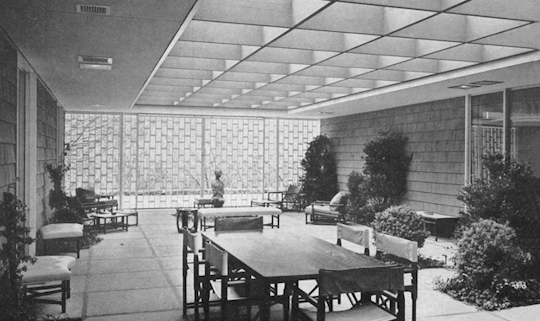
Edward Durell Stone, Carlo M. Paterno House, aka The Atrium House (1962), demolished around 2010. Image source.
Huntington Hartford Gallery of Modern Art
Stone’s later work “became more romantic and more highly embellished” (1), such as the Huntington Hartford Gallery of Modern Art built on Columbus Circle in New York City in 1964.
Paul Goldberger described the building as “an eccentric marble box on delicate legs with arches at top and bottom and characteristic Stone grill work tracery up and down the sides.” The structure's delicate legs caused many New Yorkers to refer to it as “The Lollipop Building.” In the mid-2000s the structure would become embroiled in a controversy over preservation.
“New York City's Landmarks Preservation Commission refused to consider its eligibility for landmark status” (2). Little of Stone’s original design remains after its renovation designed by architect Brad Cloepfil. (7)
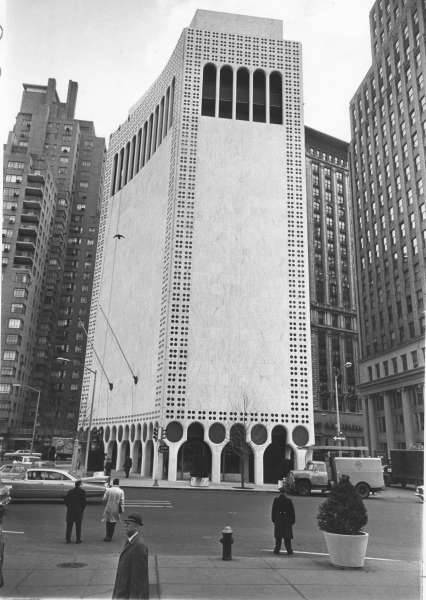
Edward Durell Stone, Huntington Hartford Gallery of Modern Art - Two Columbus Circle (1964). Image source.
Edward Durell Stone’s Later Work
Stone’s firm continued to “garner major architectural commissions”, and his later work includes, “the Standard Oil building in Chicago, Illinois (completed 1973); the First Bank Tower in Toronto, Ontario (completed 1975); and the Florida State Capitol in Tallahassee (completed 1978)” (2). His last residential work was the Sheldon Cohen House (1976) in Greenwich, CT. (3) Although successful, these later works earned more scorn than praise from the critics.
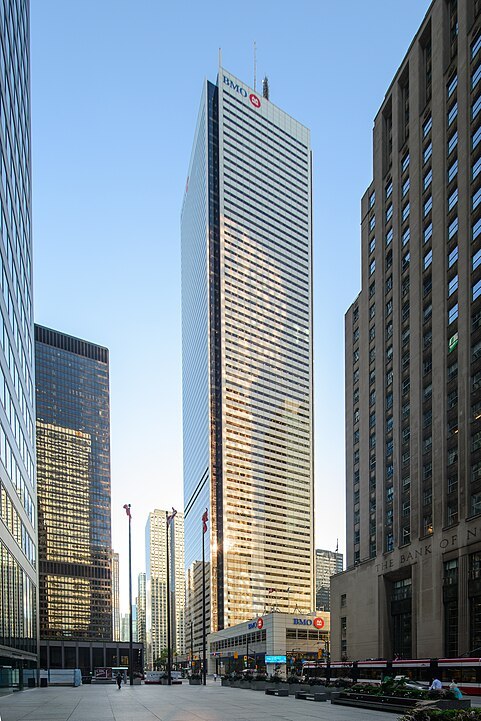
Edward Durell Stone, First Bank Tower (1975), Toronto, Canada. Photo credit: Arild Vagen. Image source.
In 1966 Stone and his muse, Maria Elena Torch, divorced. He remarried in 1972, this time to his executive assistant, Violet Campbell La Stella. The couple had a daughter, Fiona Campbell Stone…. Declining health forced Stone to retire from active practice in 1974.” (2) His firm Edward Durell Stone & Associates, however, remained in business until 1993.
Stone’s Tributes and Legacy
During his career Stone had several honorary degrees bestowed on him including one from the University of Arkansas in 1951. (4). Stone received numerous awards for his work including the Medal of Honor from the New York Chapter of the American Institute of Architects in 1955. He became a Fellow of the American Institute of Architects in 1958 (2). He won the Horatio Alger Award in 1971. (4) The Mullins Library at the University of Arkansas holds “an extensive collection of project and personal photographs in addition to a collection of architectural drawings and papers” (2).
Edward Durrell Stone died after a brief illness in New York City on August 6, 1978. (1) His career spanned five decades and encompassed Art Deco, the influence of Frank Lloyd Wright, Modernism, and his own unique decorative style of architecture, reacting against the cold International Style. As Paul Goldberger wrote, “Mr. Stone sought not to go beyond the International Style but to turn the clock back to a personal kind of modern architecture.”
References
Goldberger, P., (7 August, 1978). Edward Durell Stone Dead at 76; Designed Major Works Worldwide. https://www.nytimes.com/1978/08/07/archives/edward-durell-stone-dead-at-76-designed-major-works-worldwide-a.html
R. L. Skolmen and H. Stone, (n.d.). Edward Durell Stone: Life. https://www.edwarddurellstone.org/
Smart, G., (2024). Edward Durell Stone, FAIA (1902-1978). https://usmodernist.org/stone.htm
Wikipedia.com, (7 February, 2014). Edward Durell Stone. https://en.wikipedia.org/wiki/Edward_Durell_Stone
Edward Durell Stone, The Evolution of an Architect, (New York: Horizon Press, 1962), 92.
Britannica.com, (n.d). Edward Durell Stone, American architect. https://www.britannica.com/biography/Edward-Durell-Stone#ref81069
Goldberger, P. (18 August, 2008). Hello, Columbus. https://www.newyorker.com/magazine/2008/08/25/hello-columbus
3 notes
·
View notes
Text
Benefits of Paid Education in PORTUGAL
Unilife abroad career solutions
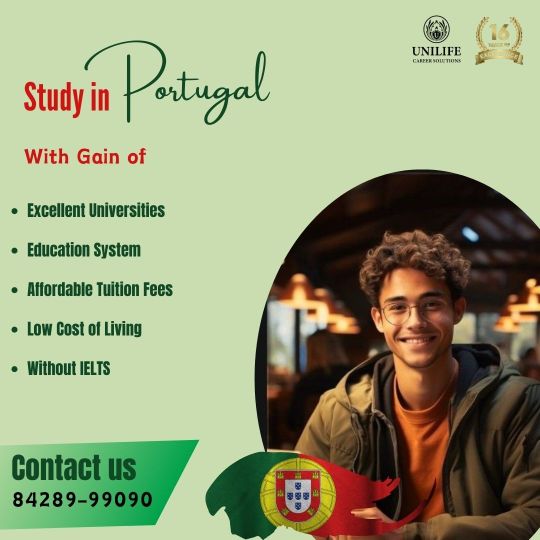
The climate is of one of the best in Europe
Perched on the western edge of Europe, Lisbon is the continent’s sunniest capital city and has an average temperature of around 20°C (that’s 68°F). The city boasts an average of more than 200 days of sunshine per year, so you’ll notice immediately how nice the weather is.
Generally speaking, Portugal is hot in the summer and has moderate temperatures in the winter. So if you're looking for some winter sunshine, Portugal is a fantastic option!
Portugal features reputable universities with beautiful campuses
With gorgeous and historic campuses, several universities in Portugal are strategically located close to the city's center yet still feature plenty of open and green areas. All over the country, you will find universities with a reputation around the world. The QS World University Rankings 2021 placed seven Portuguese universities in the list of top universities in the world.
As a Bologna Process participant, Portugal upholds the level of higher education in Europe. All higher education degrees, including bachelor's, master's, and doctoral degrees, are available in Portugal. Your career will certainly advance thanks to a degree from a university in Portugal or a study abroad semester at one of the many programs there.
Security is a priority
As it should be. The Portuguese take security very seriously. In fact, according to a global peace index, Portugal is the sixth most peaceful nation in the world.
Despite the low crime statistics, pickpocketing, bag snatching, auto break-ins, and thefts from vacation homes and cars are frequent in popular tourist destinations and may include violence. As in any country, it's better to remain on guard, keep an eye on your possessions, and watch out for thieves who may be utilizing deception to their advantage. However, generally speaking, Portugal and its inhabitants firmly believe in mutual respect for one another.
The quality and price of education can’t be beat
You’ll want this country on your list if you’re searching for cheap places to study abroad. You’ll find world-class, affordable education in Portugal, which is also noteworthy in terms of global rankings. For example, the University of Lisbon offers a variety of programs and locations for every students’ needs.
The cost of tuition and fees is relatively affordable, particularly for degrees that are taught in English. Many colleges also encourage room sharing, so you can further reduce the cost of your study abroad program in Portugal.
You can study in English
Although learning Portuguese is a great reason to study abroad in Portugal, learning any language is that much more challenging when all classes are taught in the target language. If you’re asking yourself, “Can I study in English in Portugal?” before you hit send on your study abroad application, we have good news for you.
Programs in Portugal are increasingly being taught in English, especially at the master's level, thus Portuguese is not required. Fortunately, the majority of universities offer options for students to study in English in Portugal
Exchange students can study and work
Part-time employment is permitted for international students while they are studying in Portugal. During their semester, they are permitted to work up to 40 hours. Additionally, they may have the chance to work longer hours throughout the summer and during breaks.
You must obtain permission from migration in order to work while you are a student in Portugal. This can offer a huge benefit if you’re looking for ways to help pay for part of your living expenses while you're studying in Portugal.
Portugal offers a comfortable cost of living
One of the main benefits of studying in Portugal is that it is comparatively less expensive than the rest of Western Europe. Portugal is an ideal location for you if you have a limited budget yet wish to receive a top-notch education overseas. With less than $1,000, you may survive relatively well in smaller student cities.
Unilife abroad career solutions
Conatact us : 8428440444 , 8608777070 , 8428999090
Mail Id : [email protected] , [email protected]
2 notes
·
View notes
Text
Direct Admission in Mbbs Abroad: A Gateway to Global Medical Education

Introduction:
In today's competitive world, pursuing a career in medicine has become a dream for many aspiring students. However, due to limited seats and intense competition in domestic medical colleges, more and more students are looking for opportunities to secure direct admission in MBBS abroad.
Why Choose Direct Admission in MBBS Abroad?
Direct admission in MBBS abroad opens up a world of possibilities for students who aspire to become successful medical professionals. Here are a few reasons why opting for overseas education can be a game-changer.
Affordable Tuition Fees: Many countries offering direct admission in MBBS abroad have significantly lower tuition fees compared to domestic institutions. This cost advantage attracts students from various financial backgrounds who may find it difficult to afford the exorbitant fees of private medical colleges or universities in their home countries.
No Entrance Exams: One of the primary advantages of pursuing MBBS abroad is the absence of entrance exams. While securing admission in prestigious medical colleges domestically can be challenging and require exceptional scores in entrance tests, universities abroad often offer direct admission based on merit or other criteria.
Global Exposure and Diversity: Studying MBBS abroad exposes students to diverse cultures, languages, and medical practices. They get the opportunity to interact with peers from different nationalities, exchange ideas, and gain a broader perspective on healthcare.
International Recognition and Accreditation: Many renowned medical universities abroad are recognized by global accreditation bodies like the World Health Organization (WHO), the Medical Council of India (MCI), and the General Medical Council (GMC) in the United Kingdom.
Diverse Learning Environment: Another significant advantage of pursuing MBBS abroad is the exposure to a diverse learning environment. International medical universities attract students from various countries, creating a multicultural and inclusive atmosphere. Interacting with classmates from different backgrounds enhances cross-cultural understanding and promotes a global perspective on healthcare.
Advanced Infrastructure and Technology: Many universities offering direct admission in MBBS abroad boast state-of-the-art infrastructure and cutting-edge technology. These institutions prioritize investing in modern facilities, well-equipped laboratories, and advanced medical equipment.
Quality of Education: Renowned universities abroad often have a reputation for providing high-quality education. These institutions employ experienced faculty members who are experts in their respective fields.
Clinical Exposure and Practical Training: Opportunities for Research and Specialization: Several international universities encourage research and offer opportunities for students to engage in scientific studies. By participating in research projects, students can contribute to medical advancements and gain a deeper understanding of specific areas of interest.
Enhanced Language Skills: Studying MBBS abroad often involves learning in a different language. This experience not only helps students develop proficiency in a foreign language but also enhances their communication skills. Effective communication is crucial in the medical field, as it enables doctors to understand patients and convey medical information accurately.
Personal and Professional Growth: Pursuing MBBS abroad is not only about academic excellence but also about personal and professional growth. Living in a foreign country exposes students to new challenges and experiences, promoting independence, adaptability, and resilience.
Conclusion:
Direct admission in MBBS abroad offers a viable pathway for students to realize their dreams of becoming doctors without the barriers of intense competition and complex admission processes. The benefits of affordable tuition fees, international exposure, and global recognition make pursuing an MBBS degree overseas an attractive option for aspiring medical professionals.
3 notes
·
View notes
Text
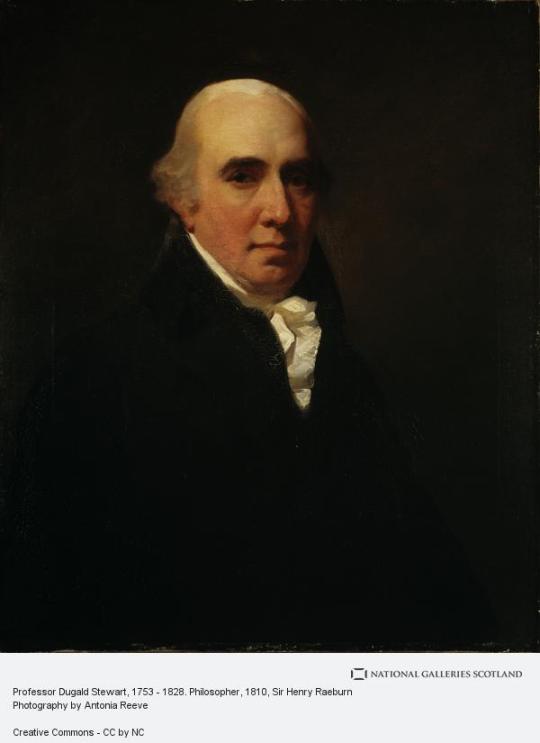
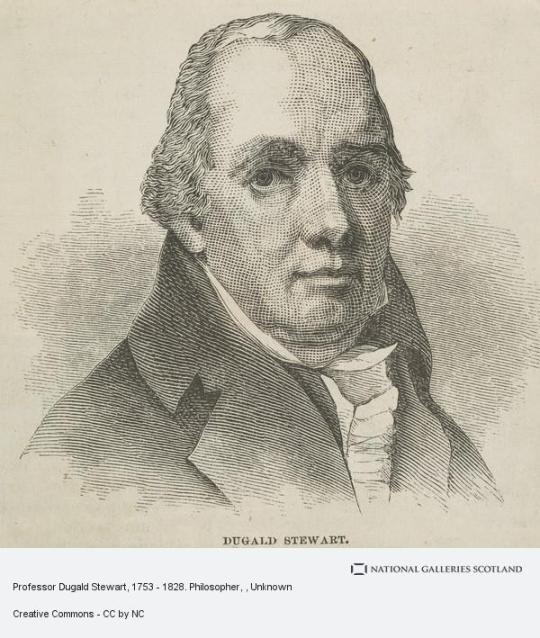
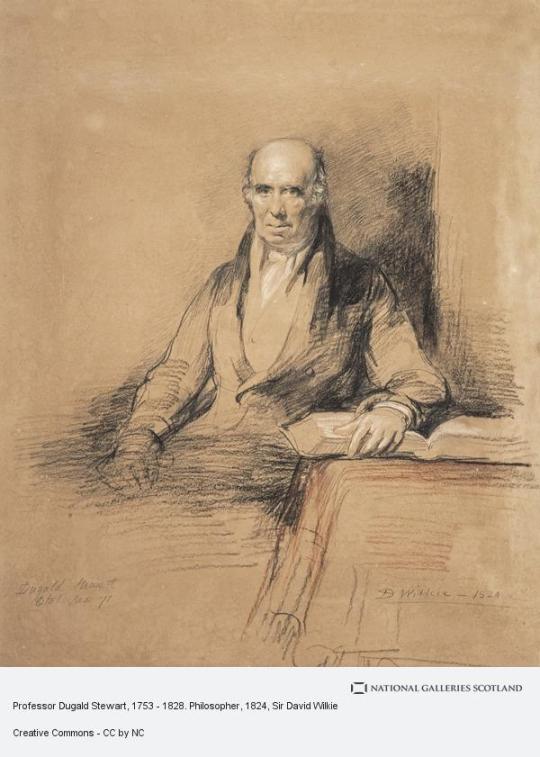
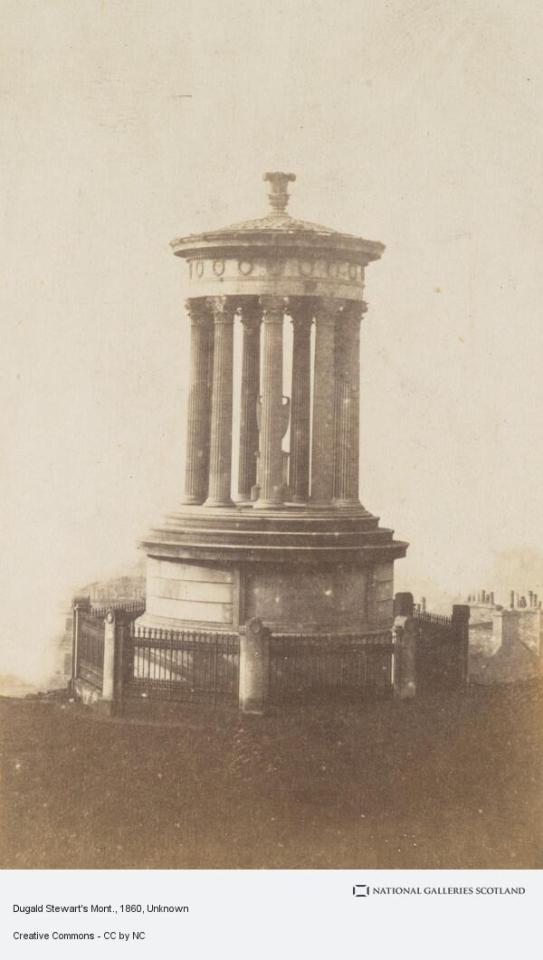
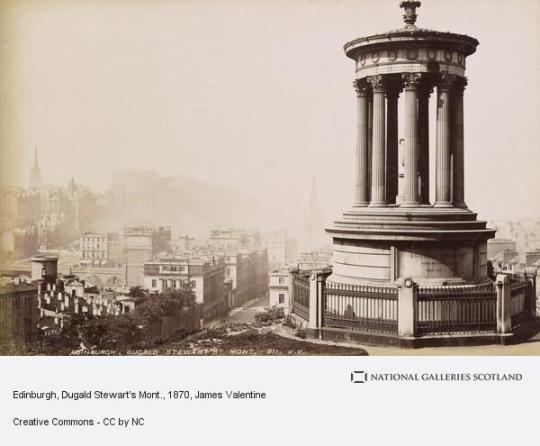
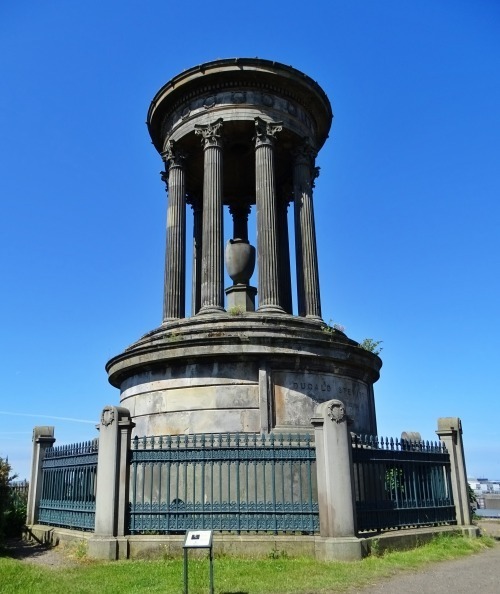
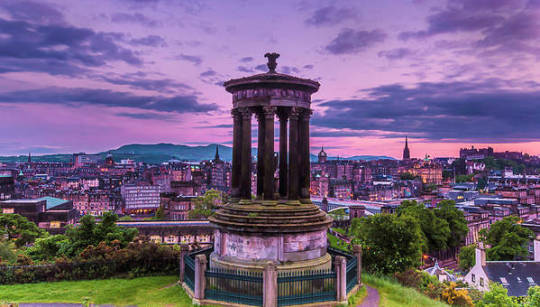
Dugald Stewart the noted Scottish mathematician and philosopher was born on November 22nd 1753 in Edinburgh.
Dugald Stewart was a Scottish philosopher and mathematician. Today regarded as one of the most important figures of the later Scottish Enlightenment.
The Scottish Enlightenment began in the mid 18th century and continued for the best part of a century. It marked a major shift from religion into reason. Religion had been influential in every part of Scottish life. A little over a hundred years before it resulted in a war between the Royalists and covenanters causing countless deaths in period known as the killing time, indeed during the Enlightenment the strict Calvinists Government meant some people were punished for crimes such as blasphemy.
Dugald’s father was a Professor of Mathematics at the University of Edinburgh, his mother Marjorie Stewart was the only daughter of Archibald Stewart, writer to the signet, so he had a good pedigree, he was schooled at Edinburgh high school from then entered the University of Edinburgh where he took an arts degree although he also attended courses in natural philosophy. On the advice of Adam Ferguson, Dugald Stewart spent one year in Glasgow where he attended the lectures of Thomas Reid. On his return to Edinburgh University he spent 13 years teaching mathematics.
In 1775 he was appointed joint professor of mathematics with his father. However, when Ferguson resigned as professor of moral philosophy in 1785 he was succeeded by Dugald Stewart who held the post for 25 years.
His writing included: Elements of the Philosophy of the Human Mind, published over 35 years in three volumes, Outlines of Moral Philosophy and Philosophical Essays.
Stewart left Scotland on a number of occasions to visit France. In 1806 for example he accompanied the Earl of Lauderdale in an attempt to negotiate peace with Napoleon. On a previous visit to the country, he had witnessed the outbreak of the French Revolution.
He spent much of his retirement at Kinneil House, Boness, a stately home owned by the Dukes of Hamilton since the 17th century.
My favourite wee story about Dugald Stewart involves other big hitters of the era like Dr Joseph Black, Professor Adam Ferguson, John Home and two other poets, Robert Burns, our national bard, and Walter Scott, famous for may poetic works as well as the Waverley series and Ivanhoe. I’m not sure about how Walter Scott had come to be at the meeting on Edinburgh Southside in Sciennes Hill House as he was only 15 at the time, but he must have been a bit star struck, these guys were the creme de la creme.
We know what happened, because Scott left several accounts of the meeting. Burns, it should be said, did not do so, but by then Burns was well on his way to fame and no doubt met many of Edinburgh’s literati in the Oyster Clubs and other clubs such as the Crochallan Fencibles Club, one of many he became a member of.
Scott recalled in 1827: “I was a lad of fifteen in 1786-7, when he came first to Edinburgh, but had sense and feeling enough to be much interested in his poetry, and would have given the world to know him; but I had very little acquaintance with any literary people, and still less with the gentry of the west country, the two sets that he most frequented.
“Mr Thomas Grierson was at that time a clerk of my father’s. He knew Burns, and promised to ask him to his lodgings to dinner, but had no opportunity to keep his word, otherwise I might have seen more of this distinguished man.
“As it was, I saw him one day at the late venerable Professor Fergusson’s, where there were several gentlemen of literary reputation, among whom I remember the celebrated Mr Dugald Stewart. Of course we youngsters sate silent, looked and listened.
“The only thing I remember which was remarkable in Burns’ manner, was the effect produced upon him by a print of Bunbury’s, representing a soldier lying dead in the snow, his dog sitting in misery on the one side, on the other his widow with a child in her arms. These lines were written beneath, – ‘Cold on Canadian hills, or Mindens’ plain, Perhaps that parent wept her soldiers slain: Bent o’er her babe, her eye dissolved in dew, The big drops, mingling with the milk he drew, Gave the sad presage of his future years, The child of misery baptized in tears.’ “Burns seemed much affected by the print, or rather the ideas which it suggested to his mind. He actually shed tears.
He asked whose the lines were, and it chanced that nobody but myself remembered that they occur in a half-forgotten poem of Langhorne’s, called by the uncompromising title of The Justice Of The Piece.
“I whispered my information to a friend present, who mentioned it to Burns, who rewarded me with a look and a word, which, though of mere civility, I then received and still ecollect, with very great pleasure.”
5 notes
·
View notes
Text
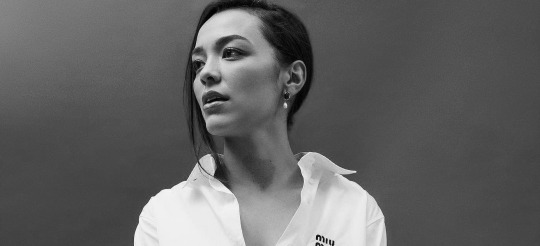
— BASICS
Name: Riley Takeda Age / D.O.B.: 30 / September 9, 1993 Gender, Pronouns & Sexuality: Nonbinary, She/they, & Queer Hometown: San Diego, California Affiliation: Government Job position: Staff Attorney at the Bronx County Public Defender’s Office Education: Bachelor’s in Political Science from NYU, and J.D. from St. John’s University School of Law Relationship status: Single Children: None Positive traits: Resourceful, Compassionate, Perceptive, Ethical, Fair Negative traits: Obsessive, Hedonistic, Argumentative, Blunt, Stubborn
— BIOGRAPHY
TW: Child abuse, parental death
Riley’s parents were career military officers, having met and started their relationship while they were both serving overseas with the Marines, and they started their family while stationed in Camp Pendleton. She grew up half on that base, though her mother insisted that she also attend public school, so she had exposure to the world outside of the armed forces. It was honestly one of the only good things that her mother did for her because it made Riley realize that she didn’t have to follow in her parents’ footsteps, even if it was obvious that they expected that of her, and it gave her an opportunity to explore interests outside of their supervision.
As she got older and learned more about how the world operated, she began to challenge the worldview that she had been raised under, much to her father’s consternation. He was a traditional man who demanded respect in the form of total obedience from his wife and child. He had made it obvious from her childhood that he was disappointed she hadn’t been a boy, and had little interest in being involved in her life outside of making sure that she wasn’t a disappointment to him. To bring home anything less than perfection would earn her a backhand or lashes with a belt, under the guise of trying to prepare her for the military, but really just trying to exert whatever control he could over her.
The first time that she learned these systems weren’t worth shit, Riley was 13 and she had worked up the courage to tell one of her teachers about the abuse. When CPS showed up at her home, they took one look at the medals decorating the family home and were effortlessly charmed by the all-American military man. After they left, he broke Riley’s arm in two places as punishment for running her mouth. He warned her that people would never believe her over him and now she had proof of that.
From that day forward, Riley threw herself into her studies because it had the dual effect of keeping her father off her back and also setting her up to be able to get out. She got a scholarship to NYU, leaving shortly after graduating high school and never looking back. She took out loans and worked third shift to put herself through college, and on a professor’s encouragement, she went on to law school in the area.
Learning about the state’s and country’s legal systems radicalized Riley further. It was proof of what she had known since they were 13: that justice was not the priority of most of those who had the power to do something about it. With her grades, she could have gone to any law firm in the city and worked a cushy corporate job, and she was certainly recruited for the diversity points, but Riley went to law school to help people and that’s what she intended to do.
She’s been with the Bronx County Public Defender’s Office for nearly three years at this point and she’s earned a reputation for being a stickler for the rules but also fighting to be fair. They’re just starting to get a little more responsibility in their cases, taking the lead on simpler matters while making it known that they want to work on the high-profile ones. They still have a bit of an idealistic view of the world, believing that they can stay neutral amongst the various criminal groups while also pissing off the police. Debatable how long that view lasts.
Over the last several months, Riley has taken personal leave from the PD's office to care for her mother who had fallen ill. It's been emotionally difficult, given her strained relationship with her mother, but she also knew that her mother had no one else. The illness progressed quickly, both a blessing and a curse for Riley, and she's finally returned to the city after her mother's death. Being out of the loop for even just a couple months has set her more off-balance than she expected, and is trying to re-establish herself within her office and the fabric of the city.
update (5/12/24)
Due to Riley's budding relationship with Theo Langley, and a perfect storm of events that culminates in Theo's arrest during a protest, Tristan taps Riley to get him out of jail. This is their first true understanding of the organization both Theo and Tristan are a part of, and a leap of faith to become part of it. They still maintain their position with the public defender's office for the time being while trying to keep their head above water in a world they were only tangentially involved with up until this point.
— WANTED CONNECTIONS / PLOTS
CLIENTS - People whose legal matters she’s handled over the years. These could be gang members, civilians, anyone who doesn’t have the money to hire private defense. They could be happy she saved them from getting railroaded by the DA’s office, or they could be pissed because she didn’t do enough to get them off. Riley has a bleeding heart and always wants to believe the best in her clients, even when they might not deserve it.
PROSECUTORS - Lawyers on the other side of the table or the “Dark Side” as they like to affectionately call them. More than likely, despite representing different interests, there will still be some professional overlap, potentially old classmates or co-workers, etc. They can be cordial, butt heads, have rabid theoretical discussions, be really nerdy about law things, and more.
COPS/LAW ENFORCEMENT - Probably something more antagonistic here, regardless of whether they’re corrupt or not. On one hand, she’s fighting to defend “criminals” and on the other, she might be throwing a wrench in carefully-laid plans. But she could also use some allies on that side of the system, someone who either also believes in working through the system, or someone who is willing to take advantage of her shortsightedness.
MANIPULATORS - Riley is in a very specific place in her life where she still has some of the bright-eyed optimism of saving the world while also becoming increasingly more jaded at how slowly the system works. While she currently still believes there is justice to be had by playing by the rules, it’ll only take one or two big things to sway her in one direction or the other. Having an up-and-coming public defender in their pocket would be a boon to anyone playing the long game.
ACTIVISM - While a lot of their life takes place in the white collar sphere, Riley tends to prefer a more down to earth lifestyle in their day to day. She’s been known to knock on doors for local politicians or lend her voice to protests, happy to provide relevant insight if her expertise is helpful, namely getting protestors and other activists out of jail and reminding them of their rights.
5 notes
·
View notes
Text
Why MBBS in Georgia Is a Smart Move for Indian Students in 2025

Introduction
Pursuing an MBBS degree abroad is becoming an increasingly popular option for Indian students, especially with the rising costs and limited seats in Indian medical colleges. Among the various countries offering affordable and quality medical education, Georgia has emerged as a hidden gem in 2025. With globally recognized universities, English-medium education, and budget-friendly living, Georgia offers everything a medical aspirant dreams of.
In this blog post, we’ll explore why studying MBBS in Georgia in 2025 is a smart decision and break down everything from top universities and the admission process to the cost of living and lifestyle for Indian students.
Top Medical Colleges in Georgia (2025 Edition)
Georgia is home to several reputable medical universities that are NMC (National Medical Commission) approved, WHO-listed, and globally ranked. Here are some of the top picks for Indian students in 2025:
Tbilisi State Medical University (TSMU) One of the most prestigious and oldest universities in Georgia, TSMU is a favorite for international students. Known for its modern labs, international faculty, and extensive hospital training, TSMU ensures top-notch education and hands-on experience.
Batumi Shota Rustaveli State University Located by the beautiful Black Sea coast, Batumi offers a calm, scenic, and safe environment. The university is ideal for students who seek quality education in a peaceful city with great Indian community support.
University of Georgia A modern campus that blends medical science with technology, the University of Georgia uses digital teaching aids, interactive lectures, and simulation labs. It is one of the most tech-savvy medical institutions in Georgia today.
Why does the university matter?
Choosing a reputed college not only ensures quality education but also gives you global exposure, internship opportunities, and career mobility.
MBBS Admissions in Georgia – What You Need to Know in 2025MBBS admission in Georgia is open now, and it's one of the simplest, most student-friendly application processes among MBBS abroad destinations.
Required Documents for MBBS Admission:
Class 10 & 12 Mark Sheets
NEET Qualifying Certificate
Valid Passport
Passport-size Photographs
Police Clearance Certificate
Fitness Certificate
→ Want help gathering your documents? Read our detailed guide on MBBS admission requirements.
Application Process Made Easy:
Apply Online through authorized admission portals like EduHawk.
Receive an Offer Letter in 7–10 working days.
Apply for a Student Visa and book your flight to Georgia!
The best part? No entrance exam beyond NEET and no donations are required.
Budget Breakdown: What’s the Real Cost of Studying MBBS in Georgia? One of the top reasons Indian students are eyeing Georgia in 2025 is affordability. Let’s see what it really costs:
Tuition Fees:
Average annual tuition fees in Georgia range from ₹3.5 to ₹5 lakhs.
This is significantly lower than most private medical colleges in India, where fees can touch ₹20–25 lakhs or more.
Cost of Living:
Monthly expenses: ₹20,000 – ₹30,000 (including accommodation, food, transport, and utilities).
Most universities offer Indian mess, shared hostel rooms, and international student support.
→ Want to compare more destinations? Check out our blog on MBBS in Russia vs Georgia.
Travel & Other Expenses:
One-time visa and flight charges: ₹70,000 – ₹1,00,000.
Books, medical kits, and health insurance are also reasonably priced.
Total 6-Year MBBS Cost in Georgia: ₹25 – ₹35 lakhs, all-inclusive, which is almost half of what you'd pay at a private college in India.
Why Georgia Stands Out for MBBS Abroad in 2025 Thousands of Indian students are moving to Georgia each year. Here's what sets it apart:
No High NEET Score Needed: While NEET qualification is mandatory, you don’t need sky-high scores to get admitted to Georgian universities. Just clearing NEET is enough — no stress of rank cut-offs or donations.
English-Medium & Globally Accepted Curriculum: All MBBS programs in Georgia are taught entirely in English, follow European credit standards, and are aligned with WHO and NMC guidelines. Early clinical exposure, digital classrooms, and practicals make the experience world-class.
→ Want to know more about NMC guidelines? Visit the National Medical Commission official site.
Student-Friendly, Safe, and Culturally Rich: Georgia ranks among the safest countries in Eastern Europe. Cities like Tbilisi and Batumi are known for their hospitality, cleanliness, and affordability. You’ll also find Indian restaurants, groceries, and festive communities, making students feel at home.
→ Georgia ranks high in global safety indexes, making it an ideal destination for students moving abroad.
EduHawk: Your Trusted MBBS Abroad GuidePlanning to study MBBS abroad can feel overwhelming. That’s where EduHawk steps in. With years of expertise in placing Indian students in top Georgian universities, EduHawk provides:
Free Career Counseling
Application Assistance
Visa & Travel Support
Post-Arrival Support in Georgia
→ Learn how we support students at every stage: EduHawk's Complete MBBS Support Services
EduHawk makes your entire MBBS journey smooth, transparent, and successful. From the first document to your hostel room, we’ve got your back.
Career Opportunities After MBBS in GeorgiaOne of the most common concerns among students is: "What happens after I complete MBBS in Georgia?" The good news is, Georgian medical degrees open doors globally.
Graduates are eligible to appear for licensing exams like:
FMGE (India)
USMLE (USA)
PLAB (UK)
AMC (Australia)
Many students go on to pursue PG in countries like Germany, Canada, and the UK. The strong academic base and global exposure make students ready for a thriving career in medicine anywhere in the world.
Final Thoughts: Georgia is the Future of MBBS Abroad in 2025
Whether you're a NEET qualifier looking for affordable options or a student seeking global exposure, Georgia offers the best of both worlds. In 2025, Georgia is not just a budget destination — it’s a smart, secure, and strategic choice for MBBS abroad for Indian students.
Recognized Degrees Affordable Education English-Medium Courses Safe & Student-Friendly Country High-Quality Medical Training
So, if you’re ready to turn your MBBS dream into reality, don’t wait. Admissions are open — and EduHawk is here to make it happen.Interested in studying MBBS in Georgia? → Contact EduHawk Now and start your medical journey with the right guidance!
#mbbs in georgia#mbbs abroad 2025#study mbbs for indian students#affordable medical colleges#nmc approved universities
0 notes
Text
Top Hostel Near Galgotias University: Safe, Affordable & Student-Friendly Accommodation Options
Looking for a reliable hostel near Galgotias University? This complete guide covers the best options for boys and girls, including amenities, location advantages, safety, fees, and booking tips — ideal for students and parents seeking comfort and convenience near campus.
Finding the right hostel near Galgotias University can make a huge difference in your academic and personal life. Whether you're a first-year student or someone looking to shift from PGs or rentals, choosing a hostel that offers safety, affordability, and comfort is essential. This guide will help you explore all your options and make an informed decision.

Why Choose a Hostel Near Galgotias University?
Galgotias University, located in Knowledge Park-II, Greater Noida, is one of the most sought-after educational institutions in North India. A large number of students come from different states and even countries, creating a strong demand for hostels near the campus.
Staying nearby means:
Saving time on travel
Easy access to academic buildings, libraries, and labs
Participation in campus events
Better study-life balance
Types of Hostels Available
There are various types of hostels near Galgotias University, including:
Boys Hostels
Girls Hostels
Co-ed PGs with hostel facilities
University-affiliated hostels
Private hostels run by professional operators
Each type offers different amenities and caters to different budgets and lifestyle needs.
Key Amenities Offered by Most Hostels
While amenities may vary, many reputed hostels near Galgotias University offer the following:
Fully furnished rooms (single, double, triple sharing)
AC and non-AC options
Attached washrooms
24/7 security with CCTV surveillance
Daily housekeeping
High-speed Wi-Fi
Nutritious meals (3–4 times a day)
Laundry facilities
Study rooms & common lounges
Gym and recreational areas
These facilities ensure a balanced lifestyle that supports academic focus as well as personal well-being.
Girls Hostels Near Galgotias University
For female students and their families, safety is a top concern. Several exclusive girls hostels near Galgotias University provide added layers of security, such as:
Female-only staff
Biometric entry
Wardens on duty 24/7
Secure campus fencing
Proximity to police stations and hospitals
Hostels like A R Residency, Shree Durga PG, and Om Girls Hostel are known for their cleanliness, homely food, and strict discipline.
Boys Hostels Near Galgotias University
Boys hostels around Galgotias come with modern facilities and relaxed environments, ideal for both studying and socializing. Options like RK Residency, Prince Boys Hostel, and KP3 PG are very popular due to their large rooms, sports amenities, and affordable pricing.
Monthly Rent & Booking Tips
The average cost for a hostel near Galgotias University ranges between ₹6,000 and ₹12,000 per month, depending on:
Type of room (sharing/single)
AC vs. non-AC
Meal plan included or not
Distance from university
Booking Tips:
Book early to secure a spot in high-demand hostels
Visit the place personally or request a virtual tour
Check reviews on Google and HostelWorld
Always read the contract before paying an advance
Inquire about refund policies
Connectivity & Transportation
Most hostels near Galgotias University are located within 1–2 km and offer easy access to the main campus. Some even provide shuttle services. The area is well-connected via autos, e-rickshaws, and the Knowledge Park Metro Station.
Who Should Stay in a Hostel?
Students from other cities
International students
Interns or researchers attending short programs
Aspirants preparing for entrance exams at nearby coaching centres
Hostel life is ideal for students who value community living, academic discipline, and affordable living arrangements.
Final Thoughts
Choosing the right hostel near Galgotias University ensures a smooth and successful college experience. Focus on safety, location, budget, and reviews while finalizing your choice. Whether you are looking for luxury hostels or budget-friendly PGs, Greater Noida has something for everyone.
0 notes